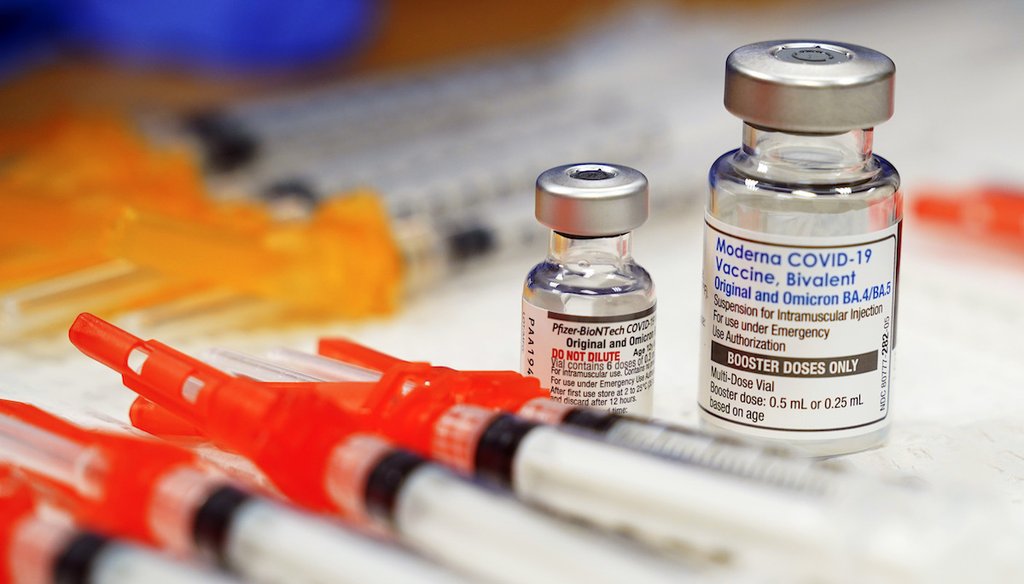Stand up for the facts!
Our only agenda is to publish the truth so you can be an informed participant in democracy.
We need your help.
I would like to contribute

Pfizer, left, and Moderna bivalent COVID-19 vaccines are readied for use at a clinic, Nov. 17, 2022, in Richmond, Va. (AP)
If Your Time is short
-
“Disease X” is not a specific known disease. For years, scientists have used the term to refer to any disease that could potentially cause a global epidemic for which there is not yet a vaccine.
-
Online misinformation about Disease X started to spread following the recent opening of a vaccine research facility in the United Kingdom. Scientists there and elsewhere around the world are preparing for Disease X by studying deadly pathogens and working to quickly develop safe and effective vaccines against them.
After three years immersed in COVID-19 pandemic research, scientists worldwide are working to identify what pathogens could spur the next severe global outbreak. But this pandemic preparedness work has also been fodder for online misinformation.
At the center of the confusion is the term "Disease X," a broad phrase scientists use to describe the source of the next potential global pandemic. But conspiracy theorists have given the name a starring role in a baseless narrative.
An Aug. 7 Instagram reel described Disease X as a pandemic and suggested it was planned. Multiple posts on X, formerly Twitter, made similar claims, calling Disease X a "plandemic."
An Aug. 8 TikTok video claimed Disease X is a "money-making scam" to "lock (people) down in their homes."
Another TikTok video from the same day showed a screenshot of an article headlined "UK scientists preparing vaccines for mystery ‘Disease X.’"
"Bulls–t," the video’s caption read. "They know what’s about to be released!"
But Disease X isn’t a specific known disease. And the only thing that is being "planned" is how to respond when a known disease emerges. Efforts to mitigate future public health crises are not evidence that pandemics are planned.
Since 2020, there have been numerous conspiracy theories that the COVID-19 pandemic was planned; these have been repeatedly debunked. Claims about Disease X are similarly off-base.
Disease X refers to any disease that could potentially cause a global epidemic for which there is not yet a vaccine.
Scientists have used this term for years. In 2015, the World Health Organization first developed a list of "priority pathogens" in order to identify and prepare for diseases that could cause global outbreaks or pandemics. Since then, the WHO has continually updated the list.
The WHO’s current priority diseases are:
-
COVID-19
-
Crimean-Congo haemorrhagic fever
-
Ebola virus disease and Marburg virus disease
-
Lassa fever
-
Middle East respiratory syndrome coronavirus (MERS-CoV) and Severe Acute Respiratory Syndrome (SARS)
-
Nipah and henipaviral diseases
-
Rift Valley fever
-
Zika
-
"Disease X"
According to the World Health Organization, Disease X "represents the knowledge that a serious international epidemic could be caused by a pathogen currently unknown to cause human disease."
Online chatter about Disease X persisted throughout the COVID-19 pandemic, but it has recently spiked following the debut of a United Kingdom research facility dedicated to the study of deadly pathogens.
On Aug. 6, the U.K.’s Health Security Agency opened a Vaccine Development and Evaluation Centre in southwest England. The facility’s more than 200 scientists are working to prepare for Disease X by assessing animal viruses that could infect humans and pathogens that do not yet have a vaccine.
The scientists are building upon the response to the COVID-19 pandemic by testing emerging vaccines against new variants. Their research will also identify areas where immunizations could be improved, such as with flu shots or mpox vaccinations.
This work is part of the "100 Days Mission," a global effort initiated by the Center for Epidemic Preparedness Innovations to make safe and effective vaccines against any potential pandemic threat within 100 days of identification. The center was launched in 2017 in Davos, Switzerland, as an international partnership between governmental, private, philanthropic and civil society organizations promoting vaccine development. It funds the 100 Days Mission, which has been backed by 18 countries, including the U.K. and the United States, and several philanthropies.
As part of pandemic preparedness efforts, scientists worldwide are working to develop "prototype vaccines" for known human diseases.
These prototype vaccines will help build a "vaccine library" that scientists can pull from and adapt quickly to create effective inoculations whenever the next Disease X is identified.
There are about 260 known viruses that infect humans, stemming from 25 virus families, the Center for Epidemic Preparedness Innovations reports.
Within a family, viruses share certain characteristics, such as structural proteins and how they replicate their DNA, said Jane Knisely, pandemic preparedness strategy coordinator for the National Institute for Allergies and Infectious Diseases, which is part of the National Institutes of Health.
"The idea is to select representative members from each of those viral families of concern and to conduct basic research … (on) making effective vaccines for those representative or prototype viruses," Knisely said.
This research gives scientists a foundation of knowledge to draw upon should any pathogen from a virus family emerge as a pandemic threat, Knisely said.
Although it’s impossible to develop vaccines against every single potential virus, the Center for Epidemic Preparedness Innovations said priority is given to researching vaccines to fight diseases that pose the greatest public health risk.
Prototype vaccines have already been put to use. One reason the COVID-19 vaccine was developed faster than previous vaccines was that scientists had already been working on vaccines against MERS-CoV and SARS, which belong to the same virus family as COVID-19.
"If that foundational work had not been done on those viruses, it would have taken much longer to conduct the research needed to make effective vaccines (against COVID-19)," Knisely said.
RELATED: Conspiracy theorists falsely claim ‘Disease X’ is the next ‘plandemic’
Our Sources
Interview with Jane Knisely, pandemic preparedness strategy coordinator for the National Institute for Allergies and Infectious Diseases, Aug. 10, 2023
Email exchange with a Center for Epidemic Preparedness Innovations spokesperson, Aug. 10, 2023
Email exchange with a Scripps Research Institute spokesperson, Aug. 9, 2023
United Nations, "Prepare to Prevent: Developing Pandemic-Busting Vaccines Against "Disease X"," Dec. 27, 2021
The U.K. Health Security Agency, "UKHSA unveils VDEC in ‘step change’ for UK’s growing vaccine capabilities," Aug. 7, 2023
The World Health Organization, "Prioritizing diseases for research and development in emergency contexts," accessed Aug. 8, 2023
The World Health Organization, "Accelerating R&D processes," accessed Aug. 8, 2023
The World Health Organization, "WHO to identify pathogens that could cause future outbreaks and pandemics," Nov. 21, 2022
Coalition for Epidemic Preparedness Innovations, "CEPI’s 100 Days Mission," accessed Aug. 8, 2023
Coalition for Epidemic Preparedness Innovations, "CEPI and SK bioscience partner to advance mRNA vaccine technology to build vaccine library, enable rapid response against Disease X," Oct. 25, 2022
Coalition for Epidemic Preparedness Innovations, "Vaccine libraries will give us a head start on the next Disease X," Nov. 29, 2021
Coalition for Epidemic Preparedness Innovations, "CEPI Pledges," accessed Aug. 8, 2023
The Centers for Disease Control and Prevention, "The 100 Days Mission—2022 Global Pandemic Preparedness Summit," Feb. 14, 2023
The New England Journal of Medicine, "Delivering Pandemic Vaccines in 100 Days — What Will It Take?," July 14, 2022
International Pandemic Preparedness Secretariat, "100 Days Mission," accessed Aug. 8, 2023
Johns Hopkins Medicine, "Is the COVID-19 Vaccine Safe?," Jan. 4, 2022
National Institute of Allergy and Infectious Diseases, "NIAID Pandemic Preparedness Plan Targets ‘Prototype’ and Priority Pathogens," Feb. 2, 2022
The Guardian, "New vaccine research centre in UK to help scientists prepare for ‘disease X’," Aug. 6, 2023
BBC News, "Porton Down: Can this laboratory help stop the next pandemic?," Aug. 6, 2023
Sky News, "‘Disease X’: UK scientists begin developing vaccines against new pandemic," Aug. 7, 2023
PolitiFact, "Conspiracy theorists falsely claim ‘Disease X’ is the next ‘plandemic’," Aug. 7, 2023
PolitiFact, "Fact-checking ‘Plandemic’: A documentary full of false conspiracy theories about the coronavirus," May 8, 2020
PolitiFact, "No, COVID wasn’t planned by FEMA to kill thousands and open concentration camps," Sept. 16, 2021
PolitiFact, "Simulation was not prep for a planned 2025 pandemic," May 5, 2023
PolitiFact, "Recycled claim is still false: The COVID-19 pandemic was not planned," Aug. 26, 2022
TikTok video (archived version), Aug. 8, 2023
TikTok video (archived version), Aug. 8, 2023
X post, Aug. 9, 2023
X post, Aug. 9, 2023
X post, Aug. 8, 2023
X post, Aug. 7, 2023
Instagram post, Aug. 7, 2023




















